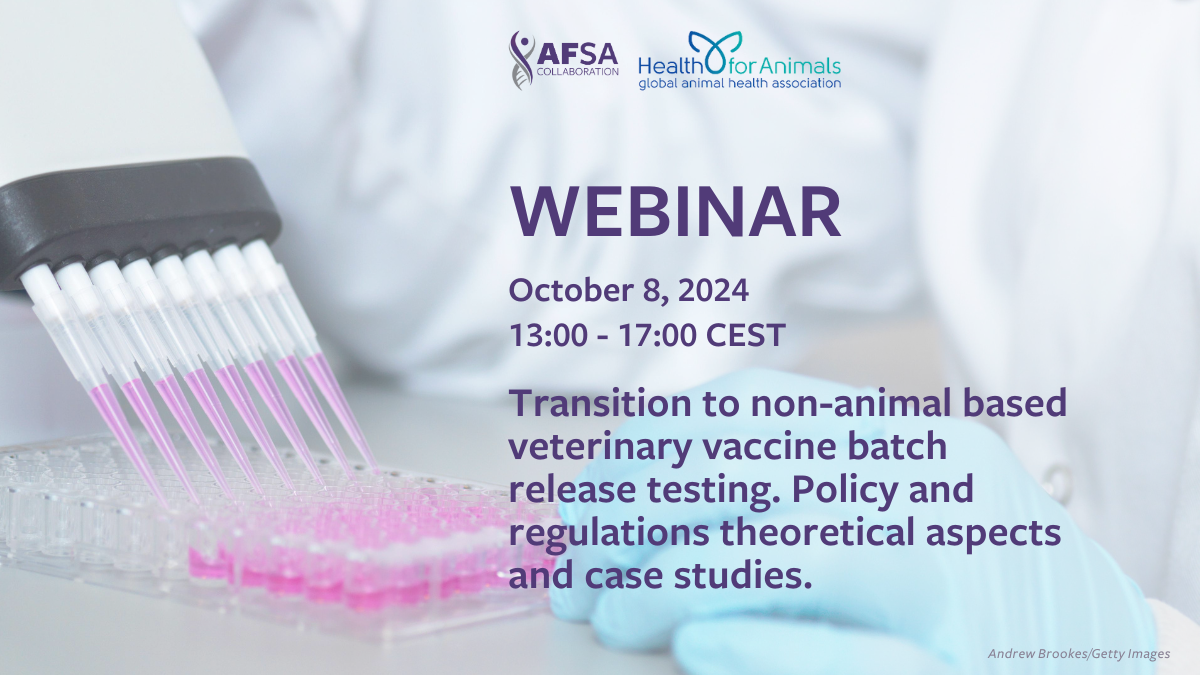The webinar is part of the collaboration between the Animal Free Safety Assessment Collaboration (AFSA) and HealthforAnimals to accelerate the implementation and regulatory acceptance of non-animal approaches for veterinary vaccines batch-release testing. The organizations are advancing the dialogue toward global regulatory alignment while promoting knowledge sharing, access to expertise and preparing recommendations on guidelines and policy changes.
The webinar would like to explain the theoretical aspects of the transition to non-animal based vaccine batch release testing that have been incorporated in regulations and guidelines and provide key insights and references to representatives of regulatory agencies and public and private testing laboratories, and manufacturers worldwide. The most representatives case studies of animal testing substitution applied on veterinary vaccines will be presented highlighting the scientific, technical, and data driven rationale for the substitution of the methods, and some of the available mechanisms of dialogue and collaboration between industry and regulatory agencies.
Target audience: veterinary vaccines manufacturers (global and local), National Regulatory Agencies and Laboratories from Europe, Americas, Africa and Asia, VICH, WOAH and FAO representatives
AGENDA
| Topic | Speaker | Min | |
| 13:00 – 13:05 | 1. Welcome and objectives | Laura Viviani, SciEthiQ for HSI | 5 min |
| 13:05 – 13:20 | 2. Update from VICH about transition to non-animal based veterinary batch release testing: focus on potency Presentation slides | Laure Martinez, Virbac | 10 mins + 5 Q&A |
| 13:20 – 13:45 | 3. Substitution of in vivo method(s) by in vitro method(s) for the quality control of vaccines – key principle of the Eur. Ph. Chapter 5.2.14 Presentation slides | Dean Smith, HealthCanada | 25 mins + 5 Q&A |
| 13:50- 14:05 | 4. The VAC2VAC project Presentation slides | Carmen Jungbäck, IABS | 10 +5mins Q&A |
| 14:05 – 15:00 | 5. Rabies case studies Presentation slides | Catrina Stirling, Zoetis Benjamin Hatat, Boehringer-Ingelheim Ignacio Gisbert, Zoetis Peter Pepels, MSD AH | 55 Mins incl. Q&A after every speaker and a final general one |
| 15:00 – 16:20 | 6. Clostridials case studies (potency and safety) | Presentations and joint Q&A | (1h and 20 min) |
| 15:00 – 15:20 | 6.1 Tetanus in vitro potency (ELISA) Presentation slides | Laura Hassall, MHRA | 15 min+5 min Q&A |
| 15:20 – 15:30 | 6.2 Clostridium tetani ELISA – applicability in veterinary industries Presentation slides | Anne Thomas, Zoetis | 5 min+5 min Q&A |
| 6.3 The BINACLE (binding and cleavage) assay for in vitro activity determination of tetanus neurotoxin Presentation slides | Heike Behrensdorf-Nicol, PEI | 20 min+5 min Q&A | |
| 6.4 Cell Based assay for Tetanus Toxin Presentation slides | Shalini Rajagopal, MHRA, Andrew Peden and Ciara Doran, University of Sheffield | 20 min+5 min Q&A | |
| 16:20 – 16:35 | 7. NGS for Adventitious viruses. Key resources for regulatory approach to HTS/NGS. Presentation slides | Blandine de Saint-Vis, Global MSAT Bio-Analytics – Sr Scientist Boehringer Ingelheim Animal Health, EDQM HTS Working Party | 10 +5 min Q&A |
| 16:35- 16:55 | 8. Closing remarks Presentation slides | Elisabeth Balks, PEI and member of the EMA 3Rs Working Party | 10 min |
SPEAKER BIOS
| Speaker | Bio |
| Laura Viviani Consultant, SciEthiQ, Italy | Since 2017, Laura has been working as consultant creating and leading global projects, many of them, dedicated to the implementation and regulatory acceptance of new non animal based assays in biologicals, including vaccines, and in general on supporting changes in the biomedical field. She collaborates with many international organizations, public and private institutions, manufacturers and regulatory authorities from LMICs, Europe and North America. Before starting her consultancy activities, she managed global projects in Novartis, GSK and for the Developing Countries Vaccine Manufacturers Network (DCVMN). She studied Philosophy and Science Communication, and she has a certification in change management. |
| Dean Smith Advisor to the Director & Sr. Evaluator, Center for Vaccines, Clinical Trials and Biostatistics at HealthCanada, Canada  | Dean K. Smith, Ph.D., is an Advisor to the Director and Sr. Evaluator in the Center for Vaccines, Clinical Trials and Biostatistics at Health Canada. He has over 25-years of experience in research and regulatory science. He is active in the development / implementation of related guidance and has a wide range of biologics-based scientific and regulatory experience from his Sr. Scientific Evaluator and management roles in Centre Divisions including Viral and Bacterial Vaccines, Hemostatic Agents & Blood Substitutes, as well as the Clinical Evaluation Division-COVID. Representing Health Canada, Dr. Smith contributes to WHO’s vaccine and vaccine stability guidance development initiatives and supports WHO’s recent efforts with COVID-19 and Mpox vaccine responses. He is Health Canada’s representative to the European Directorate of Quality of Medicines (EDQM), Group 15 (Vaccines and Sera) in support of the European Pharmacopeia, the Regulatory Advisory Committee to the WHO/Collation for Emergency Preparedness and Innovation (CEPI) and served on the Science and Ethics Advisory Committee for VAC2VAC under the European Vaccines Initiative. Dr. Smith’s Ph.D. in Immunology is from the University of Alberta, Canada, where his research dealt with vaccine antigen discovery, autoimmunity and viral vector-based gene therapy. He was a Research Associate at the National Research Council’s Institute of Biological Science, Vaccine Design Group in Ottawa prior to joining Health Canada. |
| Carmen Jungbäck Vice-Chair, IABS-EU, Germany 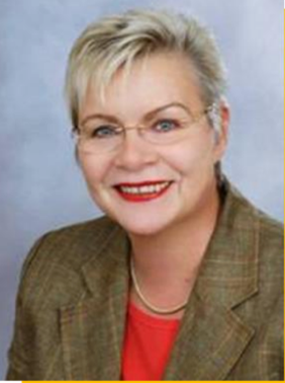 | Dr Carmen Jungbäck graduated from the Tierärztliche Hochschule, Hannover with a degree in Veterinary Medicine. In 1981, after a few years as an animal surgeon she joined the Paul-Ehrlich-Institut, (Federal Agency for Sera and Vaccines), Langen, Germany, where she was Head of the section Veterinary Virology 1 until retirement in 2016. The section’s area of activities comprises vaccine licensing and testing, with special expertise in viral vaccines for poultry. In this context, the practical testing of vaccines during licensing and for official batch release is one of the major responsibilities. She was also member of a number of advisory boards to the EDQM-OMCL Network, Ph.Eur Group 15V and CVMP-IWP and JEG3R at EMA dealing with IVMPs under various aspects. At IABS she is member of the board and Chair of the Veterinary Biologicals Committee and Vice-President of IABS – EU. She is organizing IABS meetings focusing on the veterinary field. As member of IABS-EU she was involved in the IMI projects (ZAPI and Vac2Vac) |
| Laure Martinez Technical and regulatory expert and LCM coordinator – Biological Products, Virbac, France 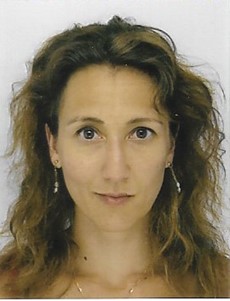 | Doctor in Veterinary Medicine by education, Laure is working as a technical-regulatory manager in Virbac France in Research and development of Veterinary Biologicals. She is representing Virbac in Animal Health industries associations as Biological Working Group from Animal Health Europe and 3Rs group from Health for Animals and 3Rs task force from Animal Health Europe. More and more involved in the 3Rs considerations, in Virbac she is now the leader of the 3R group for development of non-animal methods. Since January 2024, she also leads the VICH Batch Potency Testing Subgroup as representative of Animal Health Europe, in charge of developing a harmonized guideline on “guidance for when in vivo methods are replaced by in-vitro method(s) for the potency testing of vaccines”. |
| Laura Hassall Bacterial Vaccine Standards group, Medicines and Healthcare products Regulatory Agency, UK 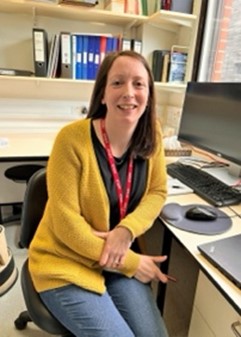 | I joined the MHRA in 2005 after completing a degree in Biochemistry at the University of East Anglia and gaining experience at a start-up biotechnology company. I have been working on the 3Rs – the Replacement, Reduction and Refinement of animal experiments for almost 20 years, with specific experience of validating serological potency assays and developing antigen ELISAs for consistency testing of diphtheria and tetanus vaccines. I currently lead the Bacterial Vaccine Standards group providing International Standards and in-house standards aimed at ensuring the quality of bacterial vaccine and therapeutic antitoxin products worldwide. |
| Heike Behrensdorf-Nicol Research Scientist, Paul-Ehrlich-Institut (Federal Institute for Vaccines and Biomedicines), Germany 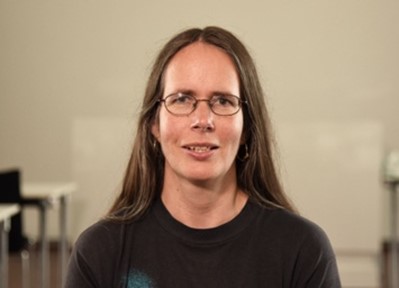 | Heike Behrensdorf-Nicol studied Human Biology at the University of Marburg (Germany) with a special focus on immunology. After receiving her diploma degree in 1996, she joined the Max-Planck-Institute for Physiological and Clinical Research in Bad Nauheim (Germany), where she performed research in the cytokine field. In 2000, she obtained a PhD in Human Biology. From 2000 to 2004, Heike was involved in research and development projects in the fields of DNA microarrays and pharmacogenetics for pharmaceutical companies in Frankfurt (Germany). Since 2004, Heike has been working for the Paul-Ehrlich-Institut (Federal Institute for Vaccines and Biomedicines) in Langen, Germany. The main focus of her work in the Division of Veterinary Medicine is the development of in vitro methods for the quality control of vaccines and biomedicines with the aim of providing modern, reliable alternatives to animal-based testing methods. Besides, she is involved in the quality management activities of the Paul-Ehrlich-Institut. |
| Anne Thomas Zoetis 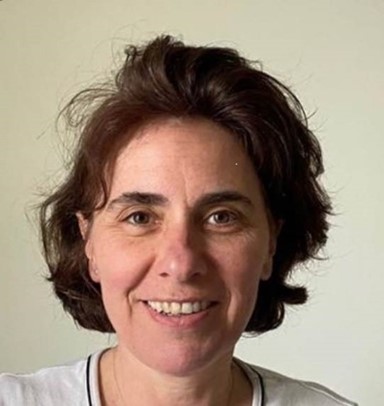 | Anne Thomas currently works in the Biologics Analytical Sciences group at VMRD, Zoetis, Belgium. She graduated from the Veterinary Medicine Faculty of the University of Liège (BE) and holds a PhD in Veterinary Sciences from the Veterinary Faculty of Liège (BE). |
| Shalini Rajagopal Medicines and Healthcare products Regulatory Agency, UK  | Since gaining her PhD in 2013, Shalini Rajagopal has worked for the MHRA on toxoids, toxins and anti-toxins focusing on tetanus and diphtheria vaccines, and microbial toxins including botulinum type A toxin and tetanus toxin and 3Rs projects. She has a B.Sc. degree in Biomedical Sciences from the University of Manchester, and a Master’s degree and Ph.D. in Reproductive Immunology from the University of Edinburgh. She is an expert in the regulation and standardisation of in vitro assays for toxoid vaccines and use of cell-based assays (CBAs) to determine toxin activity. Shalini and the MHRA are long term collaborators with Dr Andrew Peden and Dr Ciara Doran at the University of Sheffield, on the development of CBAs to detect tetanus toxin activity, with the goal of completely replacing the guinea pig/mouse assays used in tetanus vaccine production for human and veterinary use. |
| Andrew Peden University of Sheffield | |
| Ciara Doran University of Sheffield | |
| Catrina Stirling Zoetis | |
| Benjamin Hatat Boehringer-Ingelheim | |
| Ignacio Gisbert Zoetis | |
| Peter Pepels MSD AH | |
| Blandine de Saint-Vis Global MSAT Bio-Analytics – Sr Scientist Boehringer Ingelheim Animal Health, EDQM HTS Working Party | |
| Elisabeth Balks DVM, Paul-Ehrlich-Institut, Federal Institute for Vaccines and Biomedicines, Germany and member of the EMA 3Rs Working Party  | Professional career 1987, graduated in veterinary medicine from the University of Giessen/Germany 1988 – 1998, Clinical microbiology and pathology, University of Giessen Since 1998, Veterinary department of the Paul-Ehrlich-Institut, (Federal Institute for Vaccines and Biomedicines) in Langen, Germany Main fields of activity • Quality control of veterinary vaccines • Quality management • Research projects on the development and validation of alternatives to animal testing in vaccine quality control Current focus: Leptospira vaccines and tuberculins |
